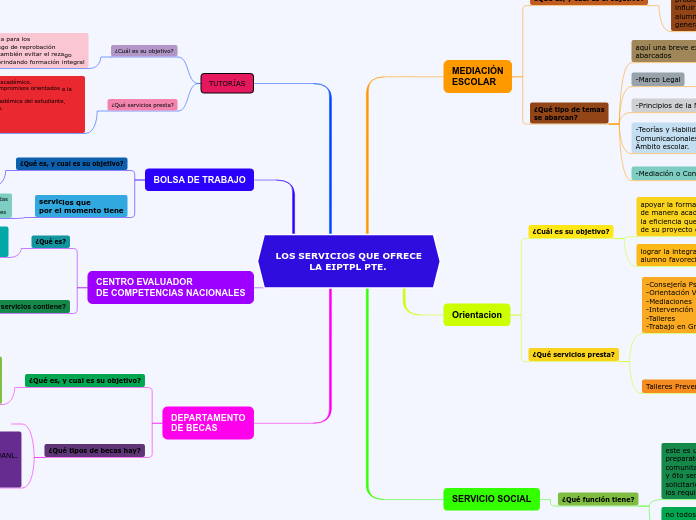av carmen arredondo lozano 5 år siden
289
LOS SERVICIOS QUE OFRECE LA EIPTPL PTE.

av carmen arredondo lozano 5 år siden
289

Mer som dette
The part of speech is a category to which a word is assigned according to its syntactic functions. In English the main parts of speech are noun, pronoun, adjective, determiner, verb, adverb, preposition, conjunction, and interjection.
A conjunction is a word like 'if' 'but' or 'and' which is used to connect sentences or clauses together.
Subordinating conjunctions are conjunctions that are used at the beginning of subordinate clauses. Some examples of these conjunctions are: although, after, before, because, how, if, once, since, so that, until, unless, when etc.
Toda las becas consisten en: reducir costos de cuotas o brindar apoyo económico al alumno siempre y cuando cumpla con los requisitos solicitados
Coordinating conjunctions always connect phrases, words, and clauses. They are: for, and, nor, but, or, yet, so.
A preposition is one of the most exciting parts of grammar. A preposition is used to describe the location of something in relation to something else.
Compound preposition consists of two or more words.
When a preposition consists of one word it is called single or simple preposition.
An interjection is used to express emotion in a sentence.
Think of other interjections!
An article is a word used to modify a noun, which is a person, place, object, or idea. Technically, an article is an adjective, which is any word that modifies a noun.
It refers directly to a specific noun or groups of nouns.
A noun is defined as a person, place, thing or idea. Proper nouns always begin with a capital letter. Common nouns, which are general words, such as 'cars,' are not capitalized.
Countable nouns are nouns that can be counted, even if the number might be extraordinarily high.
Uncountable nouns are nouns that come in a state or quantity which is impossible to count; liquids are uncountable, as are things which act
like liquids.
taller de "habilidades para la vida" que consiste en la prevención y/o intervención de problemas específicos
-Hábitos de Estudio. -Técnicas de Aprendizaje. -Vida Saludable. -Habilidades Sociales. Conductas de Riesgo.
Proper nouns are the names of specific people or places. They should always begin with a capital letter.
A verb is an action word or 'doing' word that signifies movement in some way.
A modal is a type of auxiliary (helping) verb that is used to express: ability, possibility, permission or obligation. The main modal verbs in the English language are: can, could, may, might, must, shall, should, will, would.
habla sobre proponer una cultura en la que se utilice el dialogo y atención como medida de prevención a problemáticas que puedan presentarse.
se abordan temas relacionados en nuestra forma de acercarnos o comunicarnos con nuestros alumnos y sobre la forma en que se desenvuelven en el ámbito escolar y general
habla sobre la confidencialidad, neutralidad, imparcialidad y entre otros temas.
habla sobre los orígenes de métodos alternos y hace una muy interesante comparativa con otros estados.
A verb with its own meaning: a verb that is not an auxiliary verb.